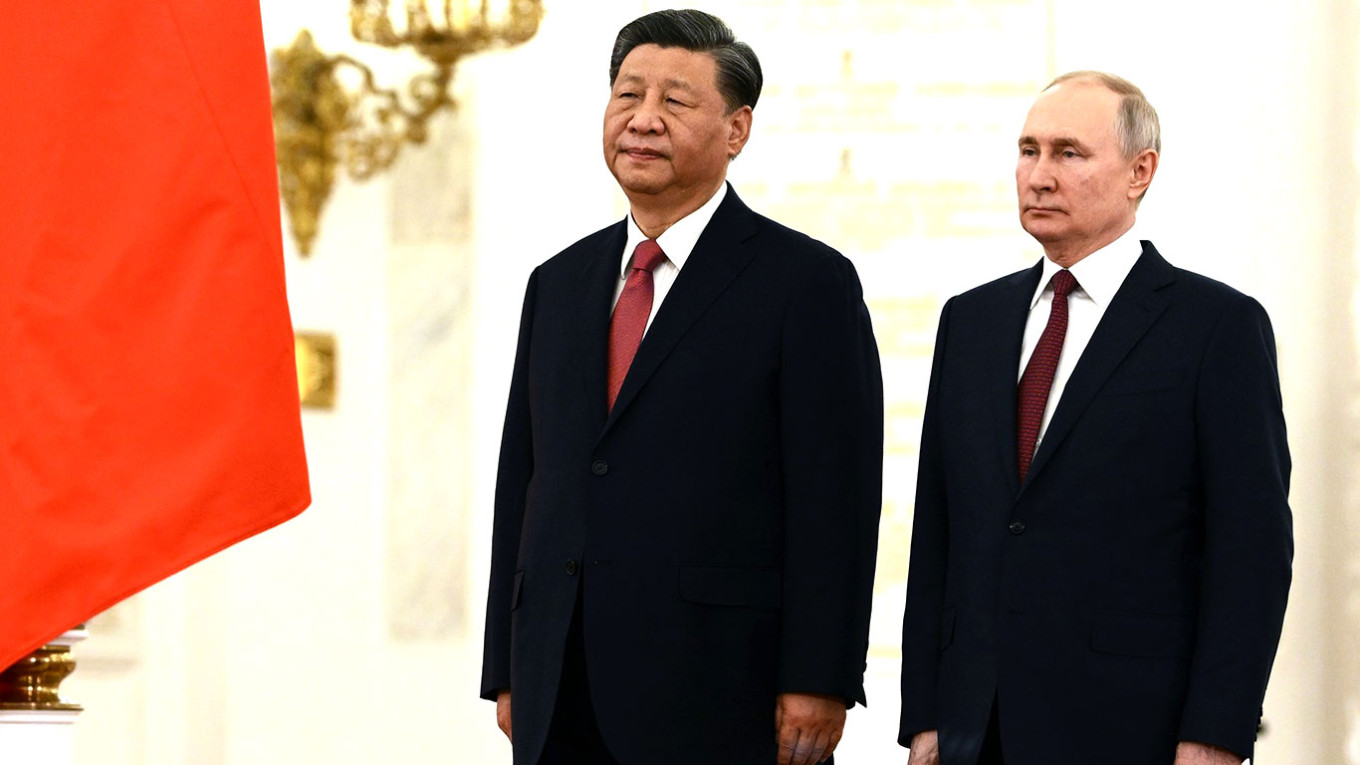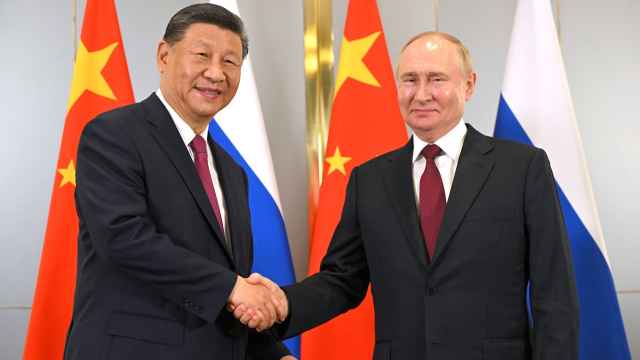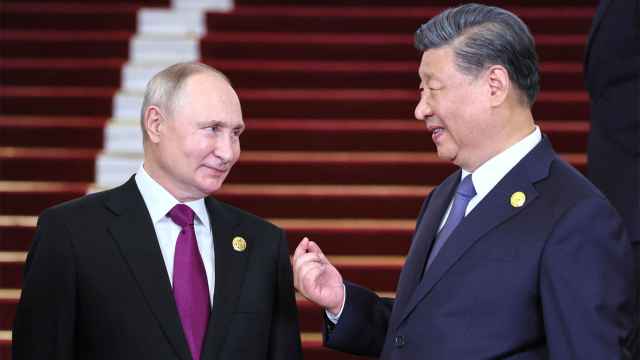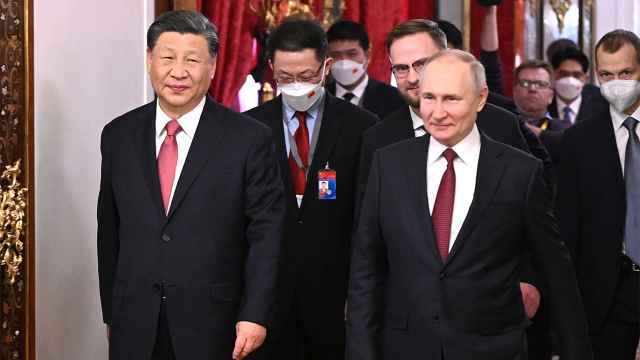Xi Jinping promised to strengthen coordination with Russia at a Kremlin summit with President Vladimir Putin on the Chinese leader's first visit to Moscow since the beginning of Russia's assault on Ukraine.
Both nations seek allies to counteract Western power and the two are expected to sign a raft of economic cooperation agreements.
Putin called the talks "meaningful and frank" and said that Russia, which has been largely cut out of European markets because of sanctions, would be able to meet China's "growing demand" for energy.
"I propose strengthening our coordination and cooperation," Xi said between two rounds of talks in the Kremlin in footage shown on Russian state television.
Putin said he was "convinced that our multi-level mutually beneficial cooperation will strengthen further."
Neither leader made any mention of the conflict in Ukraine, although the Kremlin said they would discuss China's proposal to stop the fighting.
The Chinese leader's Moscow visit has been viewed as a boost for Putin, who is subject to an International Criminal Court warrant over accusations of unlawfully deporting Ukrainian children.
Xi earlier met with Prime Minister Mikhail Mishustin and hailed Russia and China as "great neighboring powers" on the second day of his visit to Russia.
Beijing and Moscow's trade ties have boomed since Russia's Ukraine offensive, linking the nations more closely and raising worries in Western capitals over how far the ties will go.
Xi's trip coincides with a surprise visit to Kyiv by Japanese Prime Minister Fumio Kishida, who visited Bucha, a town where Russian forces were accused of committing atrocities during their occupation last year.
Ukraine's foreign ministry described the trip as "historic" and called it "a sign of solidarity and strong cooperation between (Ukraine and Japan)."
'Diplomatic cover'
On Monday, Xi and Putin held four and a half hours of talks, calling each other "dear friend."
In a rare move, Putin escorted Xi to his car after the talks, and the two were seen smiling together.
During the meeting on Monday, the Russian leader said he was open to talks on Ukraine and praised Beijing's 12-point position paper on the conflict, which includes a call for dialogue and respect for all countries' territorial sovereignty.
Another key focus for discussions will be energy ties.
Ahead of Tuesday's summit, Russian gas giant Gazprom said that supplies through the Power of Siberia pipeline to China had reached a daily record on Monday.
Russia also announced that it was extending until the end of June oil production cuts of 500,000 barrels per day, a response to Western sanctions that were due to expire at the end of March.
Xi's three-day visit began a day after Putin traveled to Mariupol in eastern Ukraine, his first trip to territory captured from Kyiv since the start of the assault in February 2022.
China has sought to portray itself as a neutral party in the Ukraine conflict, but Washington has said Beijing's moves could be a "stalling tactic" to help Moscow.
U.S. Secretary of State Antony Blinken said Xi's Moscow visit "suggests that China feels no responsibility to hold the president accountable for the atrocities committed to Ukraine."
"And instead of even condemning, it would rather provide diplomatic cover for Russia to continue to commit those great crimes," he added.
The United States has accused Beijing of mulling arms exports to Moscow, claims China has vociferously denied.
Ukrainian President Volodymyr Zelensky has said he would welcome talks with Xi, though there has been no indication from Beijing of any such plans.
Kishida in Kyiv
In Ukraine, Kishida became the last Group of Seven leader to visit the country and he expressed strong "indignation" during his visit to Bucha, which has become synonymous with accusations of Russian war crimes.
He has come under increasing pressure to make the trip, as Japan hosts the grouping's summit this May.
Japan and China are close trading partners, but Tokyo has been increasingly worried about Beijing's growing assertiveness in the region.
Japan is part of the U.S.-led security alliance known informally as the Quad, which also includes India and Australia, and positions itself as a bulwark against China's military ambitions in Asia and the Pacific.
Moscow and Beijing have over the past years ramped up cooperation, both driven by a desire to counterbalance U.S. global dominance.
While Beijing has called for an "impartial" mediation in the Ukraine conflict, Western countries have argued that China's proposals are heavy on grand principles but light on practical solutions.
The United States said last week that China's proposals would simply consolidate "Russian conquest" and allow the Kremlin to prepare a fresh offensive.
China and Russia have often worked in lockstep at the UN Security Council, using their veto power as permanent council members to counter the West.
Russia's assault on Ukraine has also deepened fears among Western powers that China could one day try to take control of the self-ruled island of Taiwan, which Beijing sees as part of its territory.
A Message from The Moscow Times:
Dear readers,
We are facing unprecedented challenges. Russia's Prosecutor General's Office has designated The Moscow Times as an "undesirable" organization, criminalizing our work and putting our staff at risk of prosecution. This follows our earlier unjust labeling as a "foreign agent."
These actions are direct attempts to silence independent journalism in Russia. The authorities claim our work "discredits the decisions of the Russian leadership." We see things differently: we strive to provide accurate, unbiased reporting on Russia.
We, the journalists of The Moscow Times, refuse to be silenced. But to continue our work, we need your help.
Your support, no matter how small, makes a world of difference. If you can, please support us monthly starting from just $2. It's quick to set up, and every contribution makes a significant impact.
By supporting The Moscow Times, you're defending open, independent journalism in the face of repression. Thank you for standing with us.
Remind me later.






